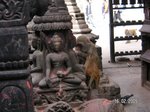Note: The posts on this page were originally part of a separate blog (reversingthegaze-self).
AUM
(first posted on 12 April 2010)
Notwithstanding best practices, penances, prayers, and anything else, I will still die. Death may come in any way, through illness, accident or treachery. It may come from the hand of an enemy who proves superior at that moment; which is fate. This does not mean I should stop what I am doing and go into hiding, or hibernation. Death will come even then. On the contrary it means I should start preparing for my (inevitable) death, so that I can pass without fear or regret.
Tags: Death, fate, practice, prayer
On The Importance Of Tourism Or About Winners And Losers
(first posted on 20 April 2011)
It takes courage to be a loser. For most of my life till now I did not need to develop this courage. I had fortune powerful enough to lead me into the delusion that I was immune from loss. Even though my marriage was a shambles, turning my personal life into a nightmare, I never felt the touch of loss. I was protected by stainless steel armour.
But loss comes to all. It came to me too. My armour lost its sheen, and loss found me. Half prepared and totally unprepared, I have now lived with loss for several years. It has changed me forever. I have become a loser.
The loss of naiveté is both comforting and disturbing. Being a loser makes one conscious of other losers. Makes one aware that losers are also human beings. I had worked with (and among) losers since my teens but till my armour was intact their lives did not really touch me. I remained an outsider. It is only when fate had decided that it was time to acquaint me with loss that I started getting affected by the people with whom my professional life intersected. At that time I thought this was the effect of a more intensive interaction. The truth was, of course, it was time for me to become a loser.
Materially speaking, and in almost all other senses, I remain a winner. My armour is still intact but it does not serve as a bubble any more. I, therefore, continue to have the luxury of contemplating loss, albeit with a greater familiarity. I wonder about those among us who seem to be permanent losers. How come? What did they do wrong? What makes the Aadivaasis losers? The Dalits, the poor, the Africans, the original inhabitants of the Americas Australia New Zealand
What does it mean to be a loser? Are members of minorities anywhere/ everywhere losers? What about women? Are women, as a class, losers? More than the enormous extent of violence against them (that exists) it is the ever present possibility of violence that makes me empathise with their plight. What about black people? Browns? Yellows? And Reds? What about the whites?
Of course most white people are losers too: in their own land. But as soon as they step out of their homes into the big wide world (a.k.a. a third world country) they become winners. So, tourism serves not only to edify and titillate and entertain, it also serves to assuage and comfort egos, and sustain the illusion of winning for a whole lot of losers.
Tags: courage, losers, loss, satire, tourism, winners
The Connection
(first posted on 13 September 2008)
Everything is linked. The thing is to find the link. In fact, everything is linked in more ways than we can see (or imagine). The foot is linked to the head and we can see it but an ant may doubt it, debate it, philosophise over it, agonise and struggle over it because she/ he cannot 'see' it.
Thus, it is possible to assert that things may be connected even when we do not see the connection. Or, we may know the connection and therefore assume it exists. For example, when we see a foot moving we will assume that it is connected to a head (because this is generally the case), even though we do not see the head. That it may actually not be connected to a head is another matter.
Going a step further, if things may be connected even when we do not see their connection, it is also possible that things we see as being connected, like the head to the foot, may be connected to each other in ways that we do not (or cannot) see, apart from the connection that we can see. In other words, the foot and the head may be connected in more than just the "normal" way via the neck, torso and the legs. What if there is a direct connection between the head and the foot? A short cut. To suggest such a thing is to invite a pooh pooh from the reader since it is clear to the meanest intelligence that there is nothing shorter that a straight line between two points and, the connection between the head and the foot (via the neck, torso and legs) is almost a straight line.
But what would be true in three dimensional space may not be true in four dimensional or multi dimensional space. There may be a more direct, shorter connection between the head and the foot, than via neck, torso, limb. What if the connection was a wireless blue-tooth, or whatever?
Tags: Connection, Everything-Nothing, Links, Multi Dimensionality
Clairvoyance
(first posted on 13 September 2008)
What do you mean when you say (to yourself or to another) that you “know”? For example, I know ………..
Think of a thousand examples. Think of a million. In each you will find that the expression “I know” is premised upon an ability to predict the future. This is extraordinary!!!!
It means that we are clairvoyance machines. All life is clairvoyant. Knowledge is clairvoyance. Of course, on average, we are only approximately clairvoyant. Despite knowledge we can not predict with certainty. But we can predict. That is the point. Life is all about predicting the future.
It means that clairvoyants are people whose ability is more developed that the average persons. It validates astrology, palmistry, tarot, tea leaves, crystal balls, magic sticks, face readers and everyone else who claims to predict. It is superfluous to add “the future” because predictions can only be about the future. So, as “knowledge” gets refined it becomes more and more about predicting the future. As “civilizations” decay, this predict-ability becomes more and more about the self. Since, “civilization” is about the self, collective and individual. In other words, the inevitable “end” of all “civilization” is to perfect the art of prediction.
Why is it then that astrology and all the other methods and means used by people to aid their powers of prediction do not give good results? Or, in other words, give such unsatisfactory results. Because, like any other “system” of “thought”, these methods are based upon a simplification of reality; which is both chaotic and complex. The simplification, which modernity generally calls a “theory”, is necessary because the reality is too complex (and chaotic) to be comprehended. In other words, this reality is too complexly chaotic (or chaotically complex) to be comprehended directly. It must be put through a “mill” that grinds (into comprehensible bits), grades (into collections of uniform size) and arranges (into groups of “similar” types) the reality inputs that we receive.
What is the mill? We are the mill? Our whole body is the mill. Every pore of our body, every organ, every sense, is geared to filtering the onslaught of inputs that reality is. Filtering it, grinding, it grading it, arranging it, making “sense” of it. With the object to refining one’s “knowledge” about reality. Why should we want to “know” (or have knowledge about) reality? Because, we need to “predict” reality. Why do we need to predict reality? Because, the ability to predict reality is crucial to our survival. Without such ability our chances of survival are greatly diminished.
Assuming Darwinian natural selection, it is obvious that once it is accepted that the ability to “predict” reality is crucial to survival this ability must increase over time. Those with a greater ability to predict are more likely to survive (and propagate) as compared with those with a lesser ability.
But what is the object of this whole game? I don’t know. Who are the “greatest” humans in any situation? They are the witch doctors, the shamans, the crystal ball readers, the palmists, the astrologers, the clairvoyants. In fact, the clairvoyants are the greatest among these greats because they don’t need any system, any theory, to be able to predict. They have the ability to pluck out the face of the future from the masses of complexly chaotic information that is available to all of us. Why do I say “face”? Because, I don’t think they “see” the future in multiple dimensions. They probably see an image of the future. One can use one of the thousands of descriptions, real and imaginary, that are available, to describe what happens. Both, the real and the imaginary are, probably, equally “true”.
What is true, what is not; what is real and what is not? I think that if we see ourselves as clairvoyance organisms (life forms, creatures, whatever) then these distinctions cease to have the kind of meaning that we are used to giving them. Imagination is as “real” as anything else. Of course, reality exists. But ‘reality’ does not exist as knife sharp distinct from ‘imaginary’. There is a huge area of overlap. Theoretically, one could learn to live in this area, able to partake of both the “worlds”.
Tags: Astrology, Clairvoyance, Future, Maya, Mind games, Reality, Witch Doctors
On Communication
(first posted on 10 September 2007)
After struggling for decades with my inability to communicate what I think and feel, I am suddenly caught by the wonder of communication. What an extraordinary thing it is that we, isolated beings are able to communicate so much that is subtle, sublime and beautiful. Communication that can bring tears to our eyes: of laughter or pain. Communication that can join us forever in love and devotion; open our eyes to the beauty of life; exalt us to euphoric heights without any drug.
I deliberately do not speak of the other kind of communication, that which destroys lives, relationships and spaces. Because, my starting point is the wonder of communication between fearful, anxious, envious, anger and hate filled, isolated and dumb selves. Without communication (or the possibility of it) we would forever be doomed death and destruction. Even if life survived on earth, it would be unimaginably horrible: a mean and vicious dance of death.
My salute to communication and communicators, however imperfect, however incomplete. May our communications always be effective and complete.
Tags: Anger, Communication, Death, Destruction, Devotion, Hate, Laughter, Love, Pain, Tears
The Shepherdess
(first posted on 1 September 2008)
All my life I have pitied those who did not live in big cities (even, in capital cities) and, consequently, envied those who lived in metros more metropolitan than mine. As a corollary, I have always wondered how people could be content to live out their lives in some remote backwater, cut off from what I imagined was the “action”, in the thick of which I imagined I was, by virtue of the fact that I lived in a capital city, plus a few other factors that made me feel privileged. It was my thesis that everyone who was someone, not just in the sense of acknowledged position and status but those who thought they were “someone”, must aspire to live in the thick of things. Again, a corollary was the notion that those who did not have such aspirations were not “someone”.
People of obvious consequence who chose not to live by my lights puzzled me. I sought to explain their contrary predilections. Often they were wealthy enough to visit the big city when they chose. That satisfied me and, in fact, helped shape in me a desire for a life away from the maddening crowd; a place from where I could venture into the thick of things whenever I chose to. But what about those who did not fit this bill? Those who lived in relative poverty, did not visit the city frequently and were content to spend out their whole lives absorbed in what they were doing. Such people were an enigma. They radiated a self assurance that I could not but envy.
But this anomaly was not enough to dent my conviction that I was living life while most of the world merely existed. The image was enough to keep me in a state of relative bliss, insulated from signs of my marginality in the scheme of things. Of course I had a circle of friends who I thought were the cat’s whiskers. Being part of my set reconfirmed me in my sense of self importance. Naturally, I imagined that I was as important to my friends’ scheme of things as they were to mine. The type of friendships I made was also geared to reinforcing this sense. We were well informed, political, opiniated. We were also self-righteous and always right. Of course we were all very “nice” people; for I’m a very nice guy too.
I am sitting before my computer screen, with a calendar photo of an elderly lady leading her flock of sheep down the street of a remote Argentinean village. It is the 1st of the month so I turned the page of the calendar a short while ago, revealing the picture. The photograph triggered a chain of thought, some of which I have just penned down. I identify with the shepherdess. I know that there is no difference between her life and mine. Perhaps hers is better. More peaceful, filled with satisfaction and contentment, fun and laughter. I am no longer hooked on my notion of “living” life. I spend my days attending to my responsibilities, nurturing my interests, wrestling with my self, watching the world go by. I know that this is the substance of all human lives.
I have filled my life with things of my choice. I am teaching myself to accept that the things that fill my life with are as empty as my life. Chimera all. I am teaching myself to accept that whatever I “do” with (or in) my life is fine. That no activity is superior to any other; or inferior, for that matter. So, the busy body who accumulates wealth or knowledge or skills is the same as the ne’er do good who whiles away his time in idle gossip. Ironically, I am also learning that the one thing that I was pretty good at even as a teenager – inactivity – is superior to activity in many ways. Of course, I was never a truly inactive person. Now, however, I am incapable of even the level of inactivity that I was so adept at several decades ago. I am hooked to “doing” something or the other at all times. And, I am aware as to how hooked I am. C’est la vie.
Tags: Illusions, Introspection, Paradoxical Selves, Urbanity
Its Time To Draw Some Lessons
(first posted on 28 July 2008)
Since my early teens I can remember being moved by “injustice” or, what I perceived as unfair. I remember reading about the Vietnam war and being angry with the communists for denying freedom to the Vietnamese people. I remember reading about the freedom struggle and being angry about the fact the “we” were enslaved by the British. I remember feeling personally humiliated by the idea of British colonisation of India
I was born in 1958, so I could not have been more than 10 years old (probably younger) when I read about the Vietnam war. I recall the bombing of Vietnam Vietnam
My anguish at British colonisation of India America America America
I have spent the next 35 years unlearning these and other values of my childhood and early youth. Many might call this a terrible waste of time but I consider it time well spent. How can justice be savage? How can democracy enslave? How could I have been blind to so much of the truth about these notions for so long?
Tags: Colonialism, Democracy, Distrust, Introspection, Musings, Paradoxical Selves, Post Colonial Angst
Post Colonial Angst
(Originally posted on 13 September 2008)
Since my early teens I can remember being moved by “injustice” or, what I perceived as unfair. I remember reading about the Vietnam war and being angry with the communists for denying freedom to the Vietnamese people. I remember reading about the freedom struggle and being angry about the fact the “we” were enslaved by the British. I remember feeling personally humiliated by the idea of British colonisation of India
I was born in 1958, so I could not have been more than 10 years old (probably younger) when I read about the Vietnam war. I recall the bombing of Vietnam Vietnam
My anguish at British colonisation of India America America America
I have spent the next 35 years unlearning these and other values of my childhood and early youth. Many might call this a terrible waste of time but I consider it time well spent. How can justice be savage? How can democracy enslave? How could I have been blind to so much of the truth about these notions for so long?
Tags: Distrust, Insight, Post Colonial Angst
Pessoptimism
(first posted on 13 September 2008)
I do not subscribe to the modern obsession with optimism: with being optimistic and, with projecting it. I am, in fact, slightly suspicious of people who project optimism, unless it is naïve; like that of childhood, or of youth. A fifty year old optimist is a perversion of nature or a politician, which amounts to the same thing.
Over the years, I have become used to friends and strangers responding with- why are you such a pessimist? On several occasions, their reactions have been strong enough to throw me into grave self doubt. Am I wrong? Despite the doubt however, I have never wavered from my instinctive feeling that pessimism is, at least, as positive a force in life as optimism. Pessimism is real, it is meaningful and, above all, it is honest. Optimism on the other hand is often chimerical and, is frequently used to subvert individual and social integrity: to sell dreams of an alternate reality to those who are unhappy with their current one and, who know that they have been shorn of all power to alter their situation. It is used to sell war to those who are at peace, to sell brutality to those who would otherwise remain, merely, callous, to sell passive acquiescence to those who would otherwise revolt. What is wrong with pessimism? When things are bleak is it not better to see them as they are and, to say them as you see them?
Pessimism is not loss of hope. They frequently coexist. It is not depression. And, even depression need not necessarily signify loss of hope, at least not a complete loss. Pessimism is not defeat, or defeatism. Robert Bruce could not have been optimistic of his chances when he waged his final battle against his enemies. In my view, he would never have won that last battle had he not been realistic and, pessimistic. Pessimism does not mean you stop making an effort. History is replete with examples of people who overcame “insurmountable” odds. What about Helen Keller? What about Gautam Buddha? I don’t think either of them would have been optimistic about their chances when they started on their quest. Let us not forget that Siddharth the prince must have been just like us when he left home: full of confusion, anxiety and despair. He could not have been optimistic about finding answers to his questions. On the contrary, it seems to me that the path to nirvana must have frequently filled him with despair, what to speak of mere pessimism.
Pessimism, in fact, can and often does, lead to great achievement. Those who decry it are probably people of shallow faith. They fail to appreciate the dogged, determined, stubborn quest for survival that actuates life. They refuse to see that pessimism is the missing link that adds to make up the critical minimum mass necessary for the chain reaction to begin. If you are not on a high then you are low, is the way most people think nowadays. Or, if you are not riding a rainbow then you are depressed. This is one of the reasons for the rampant proliferation of psychiatrists, counselors and anti depressants in the west and nowadays, in India
Besides a fundamental rejection, I also object to the optimist-pessimist binary for the ease with which it lends itself as a tool for manipulating people. Some manipulators are "good" and they help those they manipulate with the help of this binary but the overwhelming bulk of the manipulation is bad, very, very bad. We are now well and truly in a cycle of - increasing fragility leading to a bigger handle to the manipulators (the bad ones), leading to increasing fragility ..... This increasing fragility of self suits the people who control the levers of today's world. The more people have to struggle with maintaining an equilibrium of sanity the less likely they are to join in dissent and other "harmful" activities. Have you noticed how society acts on the assumption that it has the right to a greater say in the lives of people who are struggling with their selves? And, most of the time it gets away with this invasion into people's autonomy because the need to be accepted is one of the most overwhelming.
In a culture of “hope”, those who benefit from it frequently sell lies. False hope is worse than no hope. The fallout of failure is much worse when false hope is dashed, as is bound to happen. The world is drowning in the reaction of people whose hopes and expectations have been dashed. Levels of violence, cynicism and despair are at an all time high. Is it not better to take a realistic, hard headed view of things, acknowledge the extreme difficulties of the long and arduous path to be traversed and, ask people to be prepared to forge ahead step by painful step? I think this is the only way that we can rebuild our shattered society into a semblance of wholeness. I am unable to persuade myself that my view of the world (current or future) is negative, though I do have to guard against negativity like anyone else.
We Indians (and other pre-modern people) have a much better alternative to this see-saw. Our culture suggests that we cultivate a state of mind called “sam bhav”. It connotes a neutral state of mind. Neither high nor low. Take things as they come. Don’t expect good fortune, or bad. I should think such a mind is no more difficult to cultivate than any other disciplined mindset. To paraphrase Herman Hesse, we must learn to think, to fast and, to wait. To conclude, pessimism is not the death that it is usually touted to be. It is not the darkness of abject despair. It is the expectation that there will be light at the end of the tunnel, the hope of which keeps you going long after reason, and optimism, would have made you give up. It is life. Optimism on the other hand is, frequently, manic.
Tags: Binaries, Despair, Failure, Hope, Manipulation, Modernity, Pschology, Success
Success - An Introspection
(first posted on 10 September 2007)
Looking at myself is difficult but I will do it. Everything is looming large at the moment. It is as if I have shrunk and/ or the world around me has grown. A bit like Alice Alice
My life seems to have fallen into a serious mess. I could say, ‘things have fallen apart’. This leads to an interesting insight into the importance of “success”. It is only when one fails (or is a failure) that one’s failings are exposed. If one succeeds then, notwithstanding the existence of the very same failings, no one pays any attention to them. This is probably the main reason for coining the saying “nothing succeeds like success”.
Success is like the light of the sun. It blinds, it dazzles, it conceals more than it reveals, it cloaks the reality of the universe that we live in (the universe within). Failure on the other hand, like darkness at night (or, even, the light of the moon), reveals all. The truth of our existence cannot be escaped in the cold light of the stars.
Success is power. Power allows people to ride their faults. The absence of it turns the same faults into to millstones round their necks. The Rhyme of the Ancient Mariner is about power and the loss of it. About actions that seem justified when carried out (whether out of a sense of arrogance or out of ignorance) and, the agonies that we undergo thereafter. It is about the foolish arrogance that scorns its lodestar, destroying the very thing that guides and sustains it.
Tags: Albatross, Alice
Paranoia
(first posted on 10 September 2007)
Sometimes I am in a state of flux, with insights happening all the time. Almost anything- a glass of water, the sight of a tree, a few words on a page – are enough to trigger off an insight. It is as if light bulbs are going on all the time, illuminating something afresh or casting something familiar in a new light. To some extent the insights do help in improving perspective also but the larger picture is still not seen.
The question arises, how large is the picture. What if the picture keeps getting larger and larger without end?
Why do I ask this question? Is it a problem if this happens?
The answer is yes. The reason is that I want to acquire the larger picture for a collateral purpose and, not for its own sake. And, I can’t go on waiting for the picture expansion to end because I want to be able to announce that I have seen the whole picture. In this sense, no one has seen the picture, perhaps, because it is a picture without end.
Today, I felt a bulb lighting up while reading The Adventures of Huckleberry Finn: the world is a construct. We talk about various aspects of this construct quite frequently but without understanding its implications fully. For example, the ‘construct’ of manhood or, of feminity. What do we mean when we call them ‘constructs’? Does it mean there is no such thing as manhood or feminity, except in our minds; except in the minds of the human race.
Does it mean that manhood is a notion in our heads? It was not born there and, nor did it enter full grown. Its entry was an osmotic process that happened over time and, which is still happening. Its entry is proof of the existence of a dimension in space-time where we are all linked. Like the world wide web, which comes into existence by the linking of thousands of computers all over the world. One could perhaps call the space where these ‘constructs’ live and travel the life space. Is it the same as what people call the spirit world? Or, some variation of it: like the magic-realities that are so popular today. If yes, then the implications for “modern” realists are quite drastic. Mythology may turn out to be more real than history!
Theoretically, we can kill this dimension in the same way as computer cyber space; by destroying the linkage between people. But how does go about destroying something that has no wires, no power source, no ‘waves’ by which it communicates? Something that can be transmitted by a sidelong glance, a look in the eye, a grunt or, even, silence. Something that need not be transmitted in toto or full grown but is yet shared in complex detail. Which is not static but lives and grows, and evolves. Is there a switch inside us that we can turn? A plug that we can pull, isolating us from the rest?
If ‘manhood’ is a construct then so is everything else that together makes up what we call the “world”. If this is so, then who are we? Human beings? What is a human being? She/ he are just a construct. Layer upon layer of it. For, the process commences virtually the moment we are conceived and continues till we die. The construct appropriate for an embryo is different from that for an infant, for a child, for an adolescent, for and adult. At each stage of the life of a human being, layers of “reality” gets applied in the shape of sets of constructs; over which fresh layers gets applied in the next stage.
What happens when we strip off a layer or two of the construct? Do we remain human? Is there a way to deconstruct human beings? Are psychiatrists, psychologists and psychoanalysts on the right track? We all know that people deconstruct. Personalities break down. The layers, which are connected with each other in a complex hierarchy of connections, get short circuited. New dimensions to self emerge as a result. Many, if not most, of them are called “mad”. What if madness is just a different layering (manner of layering) of constructs? What if schizophrenia is just one such manner? Or, paranoia?
Tags: Dreams, Flux, Insight, Musings, Post post-modern










No comments:
Post a Comment